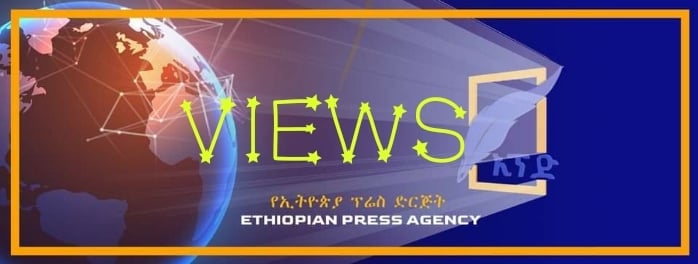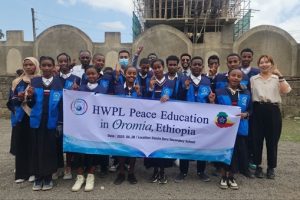
Part II
International Conflict Resolution (ICR) Diplomacy: The Threats of Irredentist Claim over Ethiopia’s Sovereign Territory This is one of the serious challenges that trigger disputes and belligerency with neighbors, namely Eritrea, Somalia, and Sudan having dealt with a serious war with the first two. The irredentist element in the Ethio-Eritrean war that occurred 2 decades ago costing hundreds of thousands of lives, however, is claimed to be coupled with other issues – mainly being the rivalry for domination in the HOA between EPLF (Eritrean regime) and TPLF [of Ethiopia]. The intertwining of such rival tendencies and personal despises between the leaders of both EPLF and TPLF has made the international conflict resolution diplomacy more challenging – with the presence of other international actors like Egypt and others making it more complex.
Nonetheless, the border conflict with Eritrea was resolved on paper a decade or so ago, leaders of both nations signing to an international agreement – whose implementation was later challenged by the TPLF which sustained the “no peace no war” status quo as its strategy to secure its hegemonic rule in the HOA rather than safeguarding Ethiopia’s national interest. Thus Ethiopia and Eritrea have been in a no war-no peace stalemate for more than a decade, until Abiy Ahmed managed to break the deadlock in a successful International Conflict Resolution (ICR) diplomacy for which he won the 2019 Nobel Peace Prize. Such diplomatic effort has bought Ethiopia a reliable partner in the HOA in this time of coordinated global diplomatic pressure catalyzed by the aligned force of Egypt, Sudan, TPLF, OLF and other Western and Middle East nations who have their own agenda/interest in the matter.
The important question here is, whether or not Ethiopia’s Abiy Ahmed and his administration will succeed in resolving the current border with Sudan, caused by the latter’s ill-advised aggression of the formers sovereign territory in an effort to provoke Ethiopia for further military confrontation – with the alleged backing and military support of Egypt. Sudan has repeatedly rebuffed Ethiopia’s welcoming diplomatic effort, perhaps emanating from a confidence boost by the ever increasing endorsement from ill intentioned west in the name of ‘political reform’ – who are rapidly and alarmingly turning hostile against the Ethiopian government.
Added to these, the backing of the Arab League countries who are under Egypt’s political influence , would make the matter even more complicated. Yet again, Ethiopia has endorsed a decoupling strategy and dealt with Sudan in a responsible manner – mitigating the possibility of fully fledged armed confrontation to the best attainable level. However, the Ethiopian government should be able to make use of its diplomatic advantage, historical ties, sociopolitical influence and economic leverage it has in neighboring [DJI, SOM, ERI, and SOUTH SUD] and other African and non-African states to mount the diplomatic pressure on Sudan in order to amicably resolve the border issue.
Network and Influence Oriented Diplomacy: Exploiting Historical, Economic and Political Advantages
Network and influence oriented diplomacy has been at the center stage of Ethiopia’s diplomacy, especially during the reign of HaileSelassie I which is considered the “Golden Age” in Ethiopia’s diplomatic history. From championing freedom and independence in Africa, Ethiopia has marshaled alliances and deep sociopolitical influence with and over the black community worldwide. Ethiopia has lent her hand for humanitarian and military support when friendly nations were in despair and looking for help, be it African, Asian or European – to mention but few, Japan, South-Korea, Britain, Congo, Rwanda, South Sudan, Somalia, South Africa, Zimbabwe, Namibia and so forth.
Ethiopia’s leading role in the formation of OAU/AU, the League of Nation and United Nations, and adherence to international laws has fermented the nation’s lasting role for the establishment and sustained existence of global and regional governance – the foundations of international diplomacy. Such historical fact is among the many reasons why the Western powers observe Ethiopia as a threat to secure a lasting imperial hegemony in international politics and global capital accumulation. Such insecurity of the western powers is even more intensified by Abiy Ahmed’s bold leadership that aspires to the restoration of Ethiopia’s historical might and influence; seek African full ecopolitical independence and unity, and a developed and proud Ethiopian nation. Now Therefore, given the fact that such achievement on the side of Ethiopia will inevitably inspire the rest of Africa, on whose natural resources the west mostly relies to feed their people and advance their tech, military and other industries, the Ethiopian government is faced with immense diplomatic pressure more than ever – and need to proceed forward with a carefully analyzed diplomatic approach that is aimed at expanding Ethiopia’s network and influence to survive such challenge – while finding a way to reconcile the nation’s interest with that of the western powers as we are better off making the global powers our friends than our enemies. In this time of unprecedented immense pressure, deploying effective and efficient diplomacy is of paramount importance.
It is a common feeling among Ethiopians that the government could have done a better job in this front by giving proper focus to its public relations and diplomatic undertakings. Needless to say, diplomacy of the twenty-first century requires adapting to the prevailing reality and tuning appropriate and fitting strategies to address the needs and deal with evolving challenges.
Foreign Aid Diplomacy: The Leverage of Traitors and Imperialists
Foreign aid is one of the key aspects that take front and center stage in Ethiopia’s foreign diplomacy, especially with the west. Besides the fact that it undermines Ethiopia’s position in global politics by leaving the fate of the nation under the blessing of the imperialists, such aid dependency has structured Ethiopia’s diplomacy with the west as – more or less -a ‘PAYCHECK’ diplomacy. This being perceived as the nation’s weakest link at the global stage, internal traitors and treasonous terrorists like the TPLF have taken advantage of it to bully Ethiopia into negotiating with them to resolve an armed conflict they recklessly started. Such conflict in the northern part of the country has been an increasing source of domestic socio-political, economic and security crisis, and mounting diplomatic challenges.
One might argue that internal affairs of a country should not be the basis for external diplomacy. However, the current global political order operates under conditional diplomacy through the use of the major global financial institutions – namely the IMF and World Bank – and the UN and its agencies – which operate under the conditions of democracy, rule of law, capitalist orientation, and so forth [subject matters that are purely domestic]. This is one of the reasons why IR critics refer to the current global institutions as ‘Agents of Neocolonialism’.
Domestic unrests and conflicts have been tapped efficiently by external forces to advance their agenda using internal Trojan horses and political entrepreneurs, who oftentimes consider themselves as defenders of group rights. And the fact that we are living in the era of social media, which is being used as an efficient tool to fabricate and spread alternative facts and disinformation rapidly has been another formidable challenge to the government, causing serious damage to Ethiopia’s foreign aid diplomacy.
Preventing and properly managing internal unrests, effectively investigating the causes and triggers of incidents with serious political implication, holding instigators of violence accountable to the law of the land; and transparently and timely communicating the information to the Ethiopian people and to the international community have been real and visible challenges to the Ethiopian government is faced with. In effect, Ethiopia’s aid and strategic diplomacy with the west has been seriously jeopardized, in addition to the national economy that one way or another relies on foreign aid and loan.
Thus, it is a demanding task to seriously and efficiently prevent and manage internal conflicts – especially those driven by instigators whose anti-Ethiopian position is known to public – in order to prevent a diplomatic crisis of a kind that blocks the government’s long awaited socio-economic and political reform – and tarnishes the image of the nation globally.
In addition, such much needed effort to prevent and manage internal divisions and conflicts will neutralize the conspiracies of Ethiopia’s historical enemies who work in tandem with internal traitors to cause more mayhem and unrest – through misinformation and disinformation; which demands adopting innovative, pragmatic and adaptive diplomacy to preserve the true image of Ethiopia in the global state.
Decoupling the Diplomatic Challenges: One Challenge at a Time
As shown in the figure the five diplomatic aspects that are coupled or associated, or connected needs to be decoupled as a pragmatic approach to address the contemporary diplomatic crisis in a more efficient manner.
Analyzing from a realist point of view, the five diplomatic aspects are interlinked in Ethiopia’s case. To begin with, the coupling of the GERD issue in the diplomatic front with the four other aspects is the easiest to discern. Sudan has crossed the Ethiopian border as bargain chip for the ongoing negotiation of the three countries on GERD, and as an attempt to mount military pressure on Ethiopia given the government’s full military focus to crackdown TPLF terrorists in Ethiopia’s Tigray.
Global powers such as the US have aligned their interest with Egypt and Sudan as related to GERD Recalling President Trump’s speech in 2020; he suggested the Egyptians might hit GERD, after repeated attempts by his administration to meddle in the negotiation and bully Ethiopia failed. His administration cut security funding for Ethiopia to prevent the successful accomplishment of GERD, which Ethiopians are building financing it themselves – with zero foreign funding Such undue and unjust pressure has also been impliedly endorsed by other Middle Eastern and Western Nations, allegedly UK, France, Israel, Saudi Arabia and so forth.
On a further note, the extension of the GERD diplomatic fallouts aligned with Ethiopia’s long standing network and influence with and on African nations, and the black race – Egypt, Sudan, the Arabs and the West is taking full advantage of the full blown diplomatic defeat Ethiopia is faced with regarding the TPLF instigated Tigray crisis. The western media and institutions that are usually criticized for their immense role in ensuring the hegemony of white supremacy and neocolonial imperialism have outrageously disgraced Ethiopia on the global political arena.
At times, they have gone as far as claiming the committance of genocide, ethnic cleansing, rape and hunger as a weapon of war, and even worse – chemical attack; laying the ground work for military intervention. The US, however, has maintained its balance between TPLF’s aggressive diplomatic lobby and Ethiopian Gov’t diplomacy; exploiting the matter towards negotiating the assurance of its interest with the Ethiopian government [esp. related to China] under the threat of Sanction and further diplomatic isolation.
Concluding Remarks:
Now that decoupling is understood as dealing with the challenges one at time, it is the task of Ethiopian diplomatic community to examine whether or not – the diplomatic challenges shall be dealt with as interlinked as they are or decoupled in a manner that clearly sets Ethiopia’s short-term and long-term interests, and priorities. The challengers on the diplomatic front may maximize the gain of their interests by coupling many aspects together, so that they leverage Ethiopia on the aspects they prioritize in their respective national policies. Those who are standing for Ethiopian side, government or public, should understand the game and try to find ways to ease those diplomatic complexities. This is how in science and engineering complex problems are solved, at times. The same shall work for politics and diplomacy.
One way or another, Ethiopia is at an epochal juncture that requires careful and professional political and IR analysis to survive, or even thrive, from and within the contemporary diplomatic mess. This principle is used in science and engineering when the problems have several variables that are interlinked with each other. We are in the age of high scientific applications across different fields and the diplomatic community can benefit in learning and applying such wisdoms to find optimal solutions.
BY BLEN M. DIRIBA, DEJEN RAS & GHIONAWIW BEDILU
The Ethiopian Herald June 8/2021





